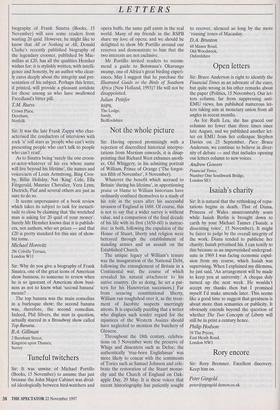Not the whole picture
Sir: Having opened promisingly with a rejection of discredited historical interpre- tations from Marxism onwards, it is disap- pointing that Richard West exhumes anoth- er, Old Whiggery, in his admiring portrait of William, Prince of Orange (The forgot- ten fifth of November', 8 November).
Whatever the benefit which accrued to Britain 'during his lifetime', in apportioning praise or blame to William historians have ordinarily confined themselves to a study of his role in the years after his successful invasion of England in 1688. Of course, this is not to say that a wider survey is without value, and a comparison of the final decade of his life with its first (1650-60) is instruc- tive: in both, following the expulsion of the House of Stuart, liberty and religion were betrayed through the establishment of standing armies and an assault on the Established Church.
The unique legacy of William's tenure was the inauguration of the National Debt, following the entanglement of Britain in a Continental war, the course of which revealed his natural attachment to his native country. (In so doing, he set a pat- tern for his Hanoverian successors.) Far from securing constitutional liberty, William ran roughshod over it, as the treat- ment of Jacobite suspects unerringly attests. It is especially puzzling that a writer who displays such tender regard for the injustices of the Western Assizes should have neglected to mention the butchery of Glencoe.
Throughout the 18th century, celebra- tions on 5 November were the preserve of Whigs and dissenters such as Defoe; the authentically 'true-born Englishman' was more likely to concur with the sentiments of Tories such as Samuel Johnson and cele- brate the restoration of the Stuart monar- chy and the Church of England on Oak- apple Day, 29 May. It is these voices that recent historiography has patiently sought to recover, silenced so long by the more `rousing' tones of Macaulay.
D.A. Brunton
68 Manor Road, Old Woodstock, Oxfordshire


















































































 Previous page
Previous page